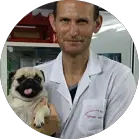Introduction
The Porcelaine, also known as the Chien de Franche-Comté, is a classic French hunting dog with a rich and extensive history. Its origins date back several centuries, and it’s believed to be the oldest of the French scent hounds. Their name, Porcelaine, is a nod to their shiny white coats that gleam like a porcelain figurine under sunlight. Known for their beautiful white coats, Porcelaine Dogs are elegant, powerful, and muscular in stature. They typically stand 22 to 23 inches tall at the shoulder and weigh between 55 and 62 pounds. Their ears are set high and should hang down neatly. Porcelaines possess a keen sense of smell and are excellent hunters. Porcelaines are known for their friendly and sociable nature. They are active dogs with a lively spirit, often demonstrating a strong drive to hunt. Despite their hunting origins, Porcelaines are gentle and very good with families. They are also known to get along well with other dogs.
| Breed | Porcelaine |
|---|---|
| Origin | France |
| Size | Medium to Large |
| Weight | 55 to 62 pounds |
| Height | 22 to 23 inches |
| Coat | Short and Glossy |
| Life Span | Approximately 12-14 years |
| Temperament | Friendly, Active, Sociable |
| Diet | Omnivore (Dog food as per vet recommendation) |
| Exercise Needs | High |
| Grooming | Moderate |
| Good with Children and Other Pets | Yes |
| Common Health Issues | Generally Healthy, Potential for Genetic Disorders |
Care and Maintenance of Porcelaine Dogs
Nutritional needs
A balanced diet is crucial for a Porcelaine’s overall health. The breed is prone to obesity, so their diet should be carefully monitored. Always consult with your vet about the best type of food and feeding routine for your Porcelaine, especially as their needs can change with age.
Exercise requirements
As a breed developed for hunting, Porcelaines require plenty of exercise. Regular walks, play sessions, and access to a secure outdoor space where they can run freely will help keep them physically fit and mentally stimulated.
Grooming and hygiene
The Porcelaine’s short, glossy coat is relatively easy to maintain. Regular brushing will help to keep their coat healthy and shiny, and as a breed with minimal shedding, this can also help to control hair around the house.
Health and Wellness
Common health issues in Porcelaine Dogs
The Porcelaine is generally a healthy breed with few known breed-specific health issues. However, like all breeds, they can be prone to certain genetic health problems. Regular check-ups with a vet are essential to catch any potential issues early.
Regular health check-ups and vaccinations
Just like any other dog, a Porcelaine should have regular veterinary check-ups. These will include routine vaccinations, flea and worming treatments, and regular dental check-ups.
Importance of pet insurance
Pet insurance is a great way to ensure that you can always afford the best care for your Porcelaine. This can cover a significant portion of the costs for surgeries, treatments, or regular check-ups.
Training and Behavior
Basic obedience training
Training should start early with a Porcelaine, and as with all dogs, it’s important to use positive reinforcement techniques. They are intelligent dogs that typically respond well to consistent, firm, but gentle training methods.
Socialization techniques
Socialization from a young age is crucial for a Porcelaine. They should be introduced to a variety of people, places, sounds, and experiences when young to grow into well-rounded dogs.
Dealing with behavioral issues
Any behavioral issues that may arise, such as excessive barking or stubbornness, should be addressed using consistent, positive reinforcement. If needed, don’t hesitate to consult with a professional dog behaviorist.
Living with a Porcelaine Dog
Porcelaine Dogs with kids and other pets
Porcelaines are known for their good nature and tend to get along well with children and other pets. However, always ensure interactions between dogs and young children are supervised to ensure safety for all.
Adapting to different living conditions
While Porcelaines can adapt to a variety of living conditions, they are active dogs that will benefit from having a yard to run around in. That being said, they can also live happily in an apartment, provided they are given enough daily exercise.
Activities and games for Porcelaine Dogs
Porcelaines are playful dogs that enjoy games like fetch or tug of war. They also excel in dog sports such as agility, tracking, or obedience competitions.
Adoption and Buying Guide
Choosing a reputable breeder
If you’re looking to buy a Porcelaine puppy, it’s crucial to find a reputable breeder who prioritizes the health and temperament of their dogs over profit.
Adoption from rescue groups and shelters
Adopting a Porcelaine from a rescue group or shelter is a wonderful way to give a dog a second chance at a happy life.
Costs involved in owning a Porcelaine Dog
Owning a Porcelaine, like any dog, comes with ongoing costs, including food, veterinary care, grooming, and pet insurance.
Show Standards and Competitions
Understanding the breed standard for Porcelaine Dogs
The breed standard for Porcelaines is set by kennel clubs and outlines the ideal characteristics, temperament, and appearance of the breed.
Preparing a Porcelaine Dog for a show or competition
Preparing a Porcelaine for a show requires dedication and hard work, and may involve professional grooming and specific training.
Common competitions and awards for Porcelaine Dogs
Porcelaines may compete in a variety of dog shows and competitions, including conformation, agility, obedience, and tracking events.
Famous Porcelaine Dogs and Owners
Notable Porcelaine Dogs in history or popular media
While the Porcelaine breed isn’t widely recognized in popular media, these dogs have a strong presence in the hunting and dog show communities.
Famous owners of Porcelaine Dogs
As an uncommon breed, there aren’t many widely-known Porcelaine owners. However, these dogs are highly prized by those who appreciate their excellent hunting abilities and friendly nature.
Porcelaine Dogs and Travel
Preparing Your Porcelaine for Travel
Whether it’s a trip to the park or a long-distance journey, it’s important to prepare your Porcelaine dog for travel. Training them to comfortably ride in a car is an essential part of this preparation. Start with short rides and gradually increase the duration. Ensure you have a safe space for your dog in the vehicle, like a well-ventilated crate or a doggy seatbelt.
Porcelaine Dogs and Flying
If you plan on flying with your Porcelaine, consult with your airline to understand their specific regulations for traveling with pets. Some airlines allow small pets in the cabin, while larger dogs like the Porcelaine may need to travel in the cargo hold. A health certificate from your vet, typically issued within ten days of travel, will often be required.
Porcelaine Dogs and Environmental Impact
Sustainable Pet Ownership
Owning a dog, including a Porcelaine, has an environmental impact. From the food they eat to the waste they produce, it’s essential to consider sustainable practices. Opt for eco-friendly pet products when possible, such as biodegradable poop bags and toys made from recycled materials.
Outdoor Etiquette with Porcelaine Dogs
As an active breed, Porcelaine dogs spend a lot of time outdoors. Teaching them outdoor etiquette, like not disturbing wildlife and other people, is essential. Also, always remember to clean up after your dog, especially in public spaces.
Conclusion
Adopting or buying a Porcelaine is a big decision that should not be taken lightly. This breed can provide a great deal of joy and companionship, but it also requires a commitment to training, exercise, and care. If you’re considering adding a Porcelaine to your family, we hope that this guide has been helpful in giving you a comprehensive understanding of what to expect. Here’s to many happy years with your future furry friend!


